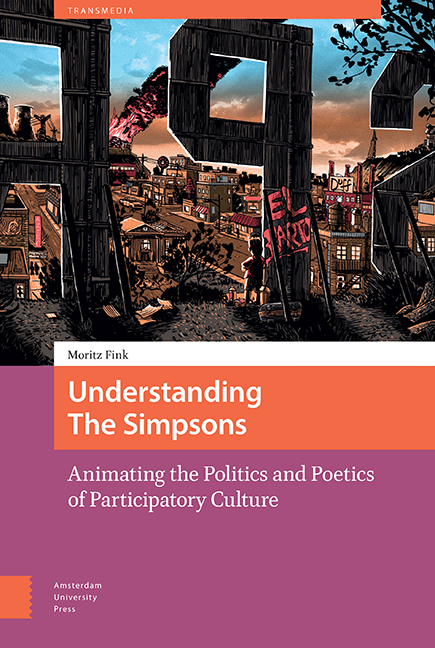Book contents
- Frontmatter
- Dedication
- Contents
- List of Images
- Acknowledgments
- Preface to the AUP Edition
- Introduction
- 1 Bart Talks Back: The Politics and Poetics of Participatory Culture
- 2 Alternative TV: The Genesis of The Simpsons
- 3 More than Just a Cartoon: Meta-Television Culture and the Age of Irony
- 4 High Fives on Prime Time: Representing Popular Culture
- 5 At the Edge of Convergence Culture: Engaging in the Simpsons Cult
- 6 Echoes of Springfield: The Simpsons in Remix Culture
- Conclusion: The Simpsons, Cultural Feedback Loops, and the Case of Apu
- Bibliography
- Index
Preface to the AUP Edition
Published online by Cambridge University Press: 21 October 2021
- Frontmatter
- Dedication
- Contents
- List of Images
- Acknowledgments
- Preface to the AUP Edition
- Introduction
- 1 Bart Talks Back: The Politics and Poetics of Participatory Culture
- 2 Alternative TV: The Genesis of The Simpsons
- 3 More than Just a Cartoon: Meta-Television Culture and the Age of Irony
- 4 High Fives on Prime Time: Representing Popular Culture
- 5 At the Edge of Convergence Culture: Engaging in the Simpsons Cult
- 6 Echoes of Springfield: The Simpsons in Remix Culture
- Conclusion: The Simpsons, Cultural Feedback Loops, and the Case of Apu
- Bibliography
- Index
Summary
Publishing an updated edition of Understanding The Simpsons has been on my mind for quite a while, though I never planned it would be realized in tandem, and somewhat supplementary to, the general-audience book The Simpsons: A Cultural History (Rowman & Littlefield, 2019). The months during which I began revising Understanding The Simpsons were not only marked by the earlier book's release in connection with The Simpsons’ thirtieth anniversary year of 2019; the Western world also found itself in a time of huge cultural turmoil. U.S. President Donald Trump and other nationalist mountebanks were seizing discursive space, reviving culture wars that had seemed long overcome. “The Media,” “The Academia,” and “The Intelligentsia” were, again, blamed as delusion organs run by smart alecks, liberal fundamentalists, bleeding hearts, and hopeless SJWs (Lisa Simpsons, that is, as Republican Senator Ted Cruz's infamously grotesque reference to The Simpsons showcased).
In late 2019—thirty years after Homer, Marge, Bart, Lisa, and Maggie had debuted on their own television show—the Simpsons’ currency, indeed, lay in the characters’ meaning as cultural icons rather than in the show's ratings. Disney's acquisition of Fox earlier that year had signaled a will to prolong the already unusually extensive trajectory of America's longest-running fictional prime-time series; moreover, it would expand Disney's palette of media content, adding one of the 1990s’ most popular cult TV shows to the company's streaming service, Disney+.
At the same time, the program's producers tried hard to revitalize The Simpsons’ political meaning. With a number of satirical swipes and direct commentary against Trump, they were using the famous franchise as a forum for articulating dissent—in an era where reality appeared to have superseded all (satirical) fiction. Expressed in the form of television comedy, the stunts certainly resonated with a larger cultural sentiment. While popular media has always informed the civic discourse in modern societies, The Simpsons’ gestures toward demonstrating political oppositionality might have contributed less to the public debate than to the amusement of the liberal community. But it seemed imperative in a time when vulgar, misogynous, and racist sentiments were no longer rhetorical excesses at the fringes but articulated by self-declared “democrats” who had become the figureheads of political powerhouses.
- Type
- Chapter
- Information
- Understanding The SimpsonsAnimating the Politics and Poetics of Participatory Culture, pp. 13 - 14Publisher: Amsterdam University PressPrint publication year: 2021



